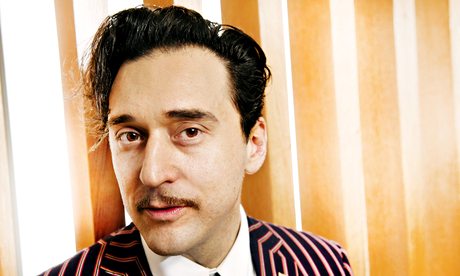
A few weeks ago, Jonathan Toubin – a renowned New York DJ – popped a little glass nugget out of his leg while he was taking a bath. It had been lodged in his thigh muscle for over two years, following a freak accident in which a taxi crashed through the wall of a hotel room in Portland, Oregon and crushed him while he slept. "I've had hundreds of fragments, from little slivers to big chunks that were surgically removed – one was as big as a small marble," he says. The jagged end of the piece in question had started poking out a month or so previously, "so I started trying to pull it out with tweezers. It eventually got so far out that you could move it around, but it was surrounded by scar tissue and skin, and its time had not yet come."
Since the accident, Toubin has become a master of Zen-like forbearance. The doctors who treated him in an intensive care unit in Portland told him that he had sustained the biggest combination of injuries they had ever tackled on one body.
"I got my skull cracked up in a couple of places, broke all my ribs, my pelvis and …" He bashfully struggles to reel off the full list now – an impressive catalogue of trauma that also includes a punctured liver, crushed lungs, hearing loss (he wears hearing aids), further fractures to the sternum and collarbones, and severed hand tendons. His hands were so swollen after surgery that he couldn't use them for months, and even now, he says: "When I type, this finger comes out and I can't really flip people off."
We meet on a brisk afternoon in London, at the start of a flurry of European gigs for Toubin: London, Brussels, Utrecht, then Camber Sands in Sussex. He cuts an exotic figure in a King's Cross gastropub, with his custom pin-striped suit, Clark Gable moustache, unruly pompadour hair and Texas-via-New York drawl.
When Toubin awoke after a month's sedation in the intensive care unit, his attendant loved ones had been prepared for the possibility that he might have brain damage. Luckily, however, despite having no memory of the crash, he says: "I aced out on my cognitive and short-term memory tests."
For some people, a near miss with death brings on a brutal sense of clarity, and they decide to change their lives. Toubin, on the other hand, wanted nothing more than to resume business as usual. His career was at a pinnacle when disaster struck, and he was playing at 300 parties a year. He was a cheerful grafter who valued people over possessions. "I didn't care much about my fate," he says. "I had this rock'n'roll lifestyle and didn't know if I was even going to be as old as I am [42]. It's ironic that the only time something horrendous happened to me is the night I decided to be good and go to bed."
Toubin took away two main lessons from the accident. First, he says: "My strength was tested on the most basic human level and I did all right. I can wake up and think: 'If anything really rotten comes my way, I've proved to myself I can take care of things.'"
Second, he learned to appreciate things that many of us take for granted: "When you can't walk, and then you can, it feels pretty good – small steps become a great triumph," he says. "When something like this happens, the only thing that's going to help you is doing the stuff you don't feel like doing, over and over again … I kept thinking about how we all worry about happiness and following our passions, but doing what you have to do is the real thing in life and very fulfilling in itself. It's like a drum break: you take the instruments away and focus on the most basic rhythm that's been driving the song the entire time, and you perhaps hadn't even noticed."
Toubin was told it would be a year before he was back in action, and he underwent months of physical therapy. "The problem was the weird ballet between all the things that were broken," he says. His damaged hands and neck brace, for instance, meant he couldn't do many of the required exercises. He was still visiting the hand doctor for torturous exercises a year after the accident. "He was a nice guy but I could hear the people in before me screaming," he says. Despite this, around the six-month mark, he began a gradual return to work, and has never looked back. The only difference now, he says, is that his approach is more "deliberate", and he takes better care of himself.
Reuniting with the world at large came with a new set of challenges. Everyone knew about the accident, which threw Toubin's relationships off balance. "Being a victim isn't fun," he says. "I went to eat with my girlfriend and best friend when I got back to New York and even the waitress started crying. Every day was like that. Every conversation I had for months." It's not that he wasn't grateful for the concern, but he longed to feel normal.
One might expect that having the unthinkable happen might have made him more fearful, but Toubin says he has never been a worrier, likening reacting to life's unexpected ups and downs to jazz improvisation. And besides, he points out, "lightning rarely strikes twice in the same place".

